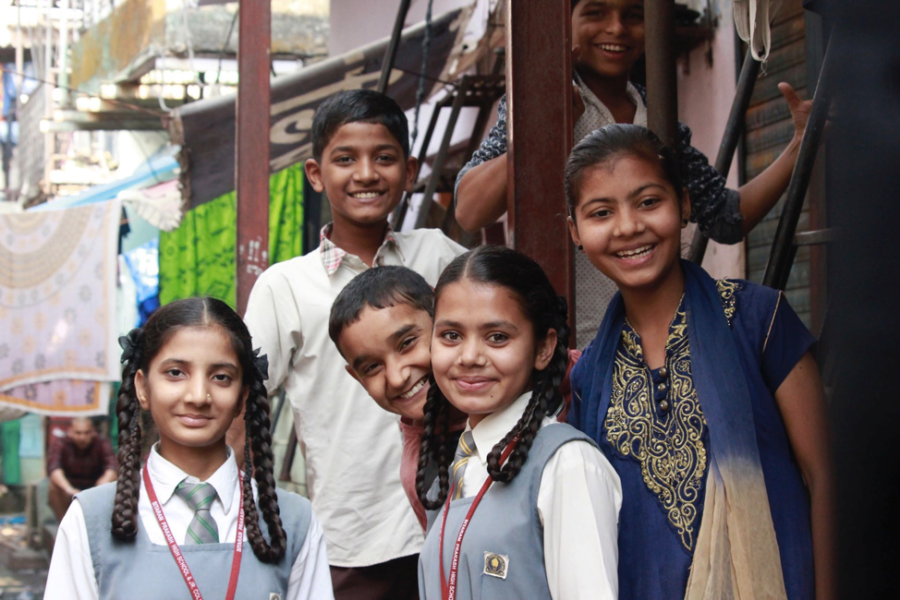Pratham Mumbai: NYU Business Students’ Perspective on “No Child Left Behind”

Last January, NYU Stern School of Business student Srinithi Kumar visited a Pratham program in Mumbai along with some of her classmates. The group was deeply affected the impact the humble facility is making on the lives of underprivileged children amid the stark inequality of the city. Srinithi has shared her thoughts and impressions regarding the experience in a heartfelt essay.
“If you give a man a fish, he won’t go hungry for a day. If you teach him to fish, he will never go hungry again.” These were the poignant words my dad used to describe Pratham to me as a child. Over ten years later, the quote still rang true to me when I, along with 20 of my classmates from NYU Stern, visited a Pratham site in Mumbai in January 2018.
My classmates and I were visiting Mumbai to supplement our semester-long course titled “Social Enterprise and Economic Development: The India Context.” We visited Pratham to observe how a social enterprise addresses the need-gaps in India’s staggering education system and reaches over 4.7 million children across 21 states in India.
As finance, business, and political economy majors from one of the most global universities in the world, most students had a preconceived notion that Pratham would fit the mold of a standard nonprofit in a developing country. In other words—many expected an organization that would fund, but not oversee long-term development of its participants; an organization that would serve as an ego boost for its benefactors. Having been involved with Pratham since my childhood, I hoped that my classmates and I would be pleasantly surprised with the work Pratham does.
Needless to say, my wishes came true—opinions were quickly transformed as we witnessed how Pratham, through partnerships with corporations and the government, created a multi-faceted learning center in the middle of a slum.
After learning about the major flaws in the Indian public school system in class, it was encouraging to see how Pratham creatively addresses its shortcomings. Proper education for the rising generations in India is essential to the advancement of the country, and NGOs like Pratham are the key to giving each child a fighting chance to earn a brighter future. I was touched to see the eagerness each child exhibited to learn: enthusiasm like that is how future leaders are born.
– Kala Berg, Business & Political Economy, NYU Stern ’18
The contrasts we observed were overwhelming to say the least. A seemingly decrepit habitat—with open wires and flowing gutters—seamlessly doubled as a library, a school, a tutoring center, and of course, a playground for beaming children with not a worry in the world. Pratham was able to create light in an undeniably dark place—we saw first-hand how a rose could grow from the concrete. The contrast in the slums was only trumped by the growing inequity apparent across Mumbai. We were lucky enough to stay in an upscale area of the city—a place that reminded us of the cosmopolitan glamour of Manhattan; a place where many said they would move to if given the chance.
We soon realized that this was not the “real” Mumbai, where the average person lives on $2/day—a city notorious for its socioeconomic divide. Pratham served as an emblem of hope and relief for us as we grappled with the burden that privilege often induces. It offered a real-life example of what our course aimed to teach us—that social entrepreneurship can offer sustainable growth solutions to India’s growing economic inequity.
What fascinated us the most about Pratham was its ability to address community development on multiple levels—engaging children, graduates and even parents. Pratham offers schooling for children aged pre-kindergarten to grade school who lack access to formalized education entirely. It tutors children enrolled in school struggling to keep up with the curriculum. It trains parents on how to foster the optimal environment at home to enable their children’s academic success. It administers vocational training and placement so that Pratham graduates, many of whom become donors and volunteers themselves, can prepare for employment opportunities around the world. In other words, Pratham built a self-sustaining system that ensures that no child, and moreover, no community, gets left behind.
Getting to witness all the good Pratham has done for Mumbai and all of India was a truly inspiring experience. The smiles on the faces of students and the engagement inside and outside of class demonstrate the level at which Pratham has and will continue to improve the future of India.
– Sean Waters, Business & Political Economy, NYU Stern ‘18
We left our Pratham visit humbled and frankly, rather emotional. Pratham’s growth trajectory has been incredible over the past ~20 years through collaboration between the public and private sectors. It comes as no surprise that Pratham is the largest NGO operating in the Indian education space.
If I could summarize our collective thoughts in a quote, it would be that “unto whom much is given, of him much is expected.” We left knowing that we can and must use our business acumen to not only build our careers, but build a better future for children across India through social enterprise—one of the world’s fastest-growing economies. On a personal level, I am extremely eager to stay involved in Pratham as I begin my full-time career in New York City this summer.
